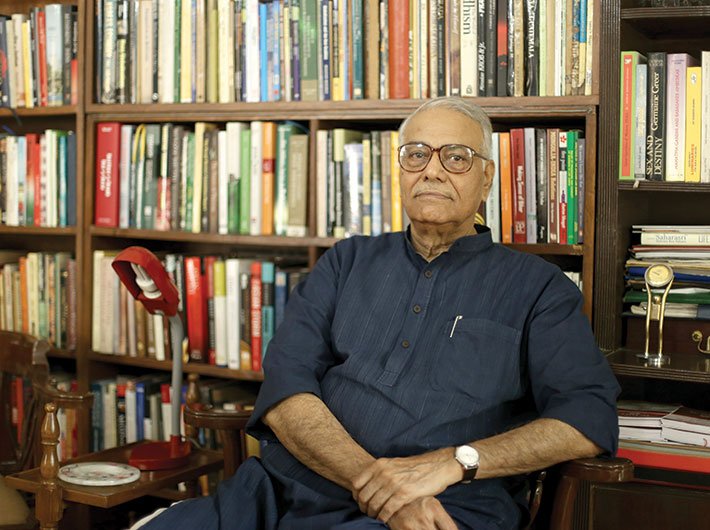It was in 1991 that we saw the real meaning of the oft-repeated phrase that it’s always ‘stupid politics’ which overtakes good economics, said former finance minister Yashwant Sinha
Former finance minister and BJP leader Yashwant Sinha has said the former prime minister Dr. Manmohan Singh should not get the sole credit for taking a bold step of ordering devaluation of rupee in 1991 and kick starting economic reforms. “He had no choice except to present the kind of budget to get over a large loan [from International monetary fund],’ he said.
In an exclusive interview that appears in a special edition of Governance Now to mark 25 years of economic reforms, Sinha recalls how prime minister Chandra Shekhar, in whose government he was serving as the finance minister, had saved India from defaulting on payment of external debts by mortgaging gold reserves to raise funds.
“Chandra Shekhar was a pragmatic leader; he even didn’t let his socialistic ideology come in the way of goof governance,” he said. “He (Chandra Shekhar) had realised that India could no longer live in isolation. He was a progressive leader. Today, many people have started acknowledging the fact that history has not judged him rightly so far”.
He said though all the successive governments since 1991 had taken reforms forward nobody had tried to build a political consensus on it. “GST [goods and services tax] is one such provision which is not happening because of the lack of consensus,” he said.
Sinha recalls that in 1991, when India had dangerously low foreign exchange reserves, “the political situation was quite shaky and the economic situation was pretty grim. This, together, was a deadly combination”.
“Actually, it was in 1991 that we saw the real meaning of the oft repeated phrase that it’s always ‘stupid politics’ which overtakes good economics,” he said.
He said that the Congress had pulled the rug under the Chandra Shekhar government’s feet right before we were to present the annual budget. “I was ordered to present an interim budget. The game plan of the Congress was clear – they knew that we were going to present a reform-oriented budget. Later the government had to go to the IMF [International monetary fund] for a bigger loan to overcome the BoP [balance of payment] crisis and also to move the economy forward.”
“[PV] Narasimha Rao took over as prime minister on June 25, 1991. Till then and even before the Chandra Shekhar [caretaker] government was always firefighting to prevent India from defaulting on repayment of external debt. This was a huge challenge. The RBI and the ministry of finance were monitoring the situation round-the-clock. It goes to the credit of the Chandra Shekhar government that in spite of being a caretaker government we managed to ensure that India did not default on repayment,” said Sinha who was at the helm when the economy was in the worst crisis.
Sinha said that all the long- and short-term loans had been taken by the Rajiv Gandhi government. “Interestingly, neither his nor the next, VP Singh government, had taken care to process the repayment. In fact, the mortgaging of gold had become an absolute necessity to make sure that the next government did not inherit an empty treasury.”
“In fact, very few people would remember today that in 1991, terrorists had abducted five Swedish nationals in Kashmir. It was Chandra Shekhar who had picked the phone to dial [Pakistan prime minister] Nawaz Sharif’s number. He spoke with Nawaz Sharif and soon the Swedish people were released. This was his way of handling a crisis. Now compare this with the handling of the Rubaiya Sayeed abduction by the VP Singh government [by releasing five dreaded terrorists in exchange for release of home minister Mufti Mohammed Sayeed’s daughter]. And we should keep in mind that Chandra Shekhar had a clout of only 56 MPs.
On what all has changed in the last 25 years, the former finance minister said that “during this period the economic growth has been far more impressive than it was before. This has resulted in creation of more wealth. However, the sad part is that this growth story has not remained consistent. It has been like a stop-and-go story and sometimes it would completely stop. Overall the economic reform has been necessarily slow”.
To read the full interview click here

